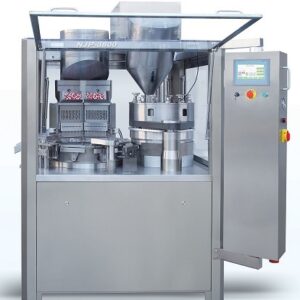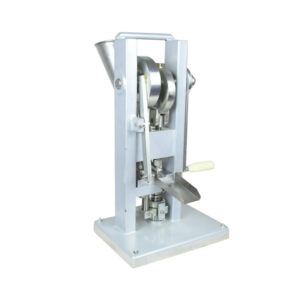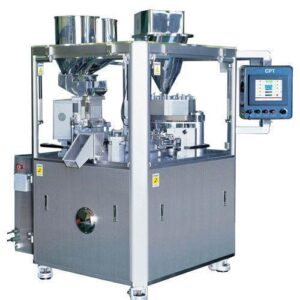Description
| Parameter | Specification |
|---|---|
| Capacity | Customizable |
| Evaporation Rate | Adjustable |
| Inlet Temperature Range | 120°C – 600°C |
| Outlet Temperature Range | 70°C – 150°C |
| Atomization Type | Centrifugal Spray |
| Heating Source | LPG (Liquid Petroleum Gas) |
| Material of Construction | Stainless Steel |
| Power Supply | 3-phase, 380V/50Hz |
| Control System | PLC Control |
| Dryer Efficiency | Up to 95% |
| Particle Size Distribution | Adjustable |
| Exhaust Gas Treatment | Cyclone Separator, Bag Filter |
| Dimensions (L x W x H) | Customizable |
| Weight | Variable |
| Application | Food, Pharmaceutical, Chemical, etc. |
The working principle of the LPG Centrifugal Spray Dryer is based on a liquid feed that gets converted into dried particles through some controlled steps. The primary components of the spray dryer are a drying chamber, atomization system, hot air generator, and cyclone separator.
Atomization: The atomization system has liquid feedstock pumped into it in the form of solutions or slurries. Here; the liquid is converted to fine droplets by using different techniques such as pressure nozzles, rotary atomizers, and centrifugal atomizers with then the intention of making the liquid go evenly throughout the drying chamber
Drying Chamber: In the drying chamber, where hot air comes into contact with atomized droplets. This hot air evaporates moisture from droplets and removes moisture-laden air out of it.
Evaporation and Drying: In this process heat energy from hot air causes the moisture within the droplet to rapidly evaporate as they travel through the drying chamber. This leads to dried particle formation that falls inside the chamber.
Separation and Collection: A cyclone separator or other filtration systems are used to store these dry particles from hot air. The collected particles can be subjected to further processing or packaging depending on specific application needs.
Applications of LPG Centrifugal Spray Dryer
Largely versatile LPG Centrifugal Spray Dryers are a valuable asset in a wide range of industries like:
Food Industry
In the food industry, LPG Centrifugal Spray Dryers are used in manufacturing powdered ingredients such as milk powder, coffee powder, powdered flavors, and food additives among many others. This ensures flavor retention and nutritional properties while extending the shelf life of perishable products
Pharmaceutical Industry
For manufacturing drug formulations, encapsulation of APIs (active pharmaceutical ingredients), inhalable powders for respiratory medications, etc., spray drying is employed in pharmacy production lines. It helps sensitive pharmaceutical compounds remain stable & efficacious. Chemical Industry
Specialty chemicals, detergents, pigments, and catalysts are manufactured by the chemical industry using LPG Centrifugal Spray Dryers. Thus, through the spray drying process of particles, it is possible to synthesize tailored materials with specific properties such as size, morphology as well as composition.
Ceramics Industry
Ceramic powders that are used in the production of tiles, sanitary ware,e, and advanced ceramics are produced through spray drying in the ceramic industry. Ceramic products’ quality and performance are achieved through uniformity and consistency that can be obtained when spray drying is applied.
Environmental Applications
LPG Centrifugal Spray Dryers are also used for environmental applications such as air pollution control and wastewater treatment. This helps in the removal of pollutants from industrial emissions through the process of spray drying while converting liquid waste streams into dry easily disposable solids.
Functions of LPG Centrifugal Spray Dryer
The functions performed by LPG Centrifugal Spray Dryer in industrial processes include;
Drying
The primary role played by a spray dryer is to eliminate moisture from liquid feedstock consequently making it dried particles fit for further processing or packaging.
Particle Size Control
Spray drying allows for control of particle size distribution in the final product by varying such parameters as atomization pressure, feed flow rate, and drying temperature.
Property Preservation
The spray dryer has controlled drying conditions that help to preserve the physical, chemical, and nutritional properties of the feedstock material; this is essential, especially in industries like food and pharmaceuticals where quality and consistent products matter most.
Production Scalability
Another advantage of LPG Centrifugal Spray Dryers is their scalability: they can be used for the production of dried particles (ranging from laboratory-scale batches to large-scale industrial quantities) making them suitable for both research and commercial applications.
Energy Efficiency
Modern LPG Centrifugal Spray Dryers are designed to optimize energy efficiency by recirculating hot air, minimizing heat losses, and maximizing heat utilization for evaporation, thus reducing operating costs as well as environmental impact significantly.
Future Trends in LPG Centrifugal Spray Drying Technology
Technology advances and industry developments have led to several trends that will shape the future of LPG Centrifugal Spray Drying:
Automation & Control Systems Integration
Advanced automation and control systems integrated with spray drying processes ensure real-time monitoring and optimization- leading to enhanced efficiency, consistency, and quality while reducing labor intensiveness.
Adoption of Novel Materials & Formulations
Spray drying processes are increasingly adopting novel materials or formulations across specialized product lines due to higher demand which include functional food ingredients advanced pharmaceutical formulations innovative ceramic materials among others.
Green Technologies Implementation
Environmental stewardship, sustainability, eco-efficiency, or green chemistry principles are becoming central to many industrial processes hence there is a shift towards using green technologies in spray drying such as renewable energy sources; waste heat recovery systems, and eco-friendly solvents among others.
Advancements in Particle Characterization Techniques.
Innovations on how particles from LPG Centrifugal Spray Dryers are characterized give manufacturers a better understanding of the properties and behavior of dried particles thus making it possible to create products that can be customized to enhance performance and functionality.
Continuous Manufacturing Processes
In some applications, traditional batch processes are being replaced by continuous manufacturing operations. Continuous spray drying systems offer distinct advantages such as increased productivity, reductions in cycle times, and improved process control.
Roles and Advantages of LPG Centrifugal Spray Dryer
Versatility
This machine is very flexible because it can handle different types of feedstock materials to produce dried particles with wide-ranging properties.
Efficiency
Spray drying offers high efficiency in terms of moisture removal, energy utilization, and production throughput. This results in lower operating costs and increased productivity.
Quality
Another benefit related to the spray dryer is that quality aspects like consistency, integrity, and product quality are maintained at high levels because of controlled drying conditions which align them with stringent quality standards.
Flexibility
Moreover, LPG centrifugal spray dryers are highly flexible since they have varied process parameters; this means that they can be adjusted by manufacturers to suit specific requirements thereby achieving desired product attributes.
Scalability
LPG Centrifugal Spray Dryers are highly scalable from small-scale laboratory experiments through large-scale industrial productions suitable for various applications as well as production volumes available on a global platform.
Economical nature
LPG Centrifugal Spray Dryers are cost-effective in the long run due to decreased power consumption, reduced product wastage, and enhanced operational efficiency.
Nature of a friendly environment
Modern spray drying techniques have energy recovery systems and emission control measures that become sustainable and environmentally friendly options to traditional drying approaches.
FAQs
What is the meaning of an LPG Centrifugal Spray Dryer?
LPG Centrifugal Spray Dryers have been designed to convert liquid feedstock into dried particles through a controlled spray process in industrial setups. It deploys LPG as a heating source for moisture evaporation from atomized droplets.
How does an LPG Centrifugal Spray Dryer work?
The spray dryer is supplied with liquid feedstock which is then transformed into fine droplets by the use of an atomization system. These are allowed to come into contact with hot air generated using an LPG-heated heater within the drying chamber. Droplets lose moisture when heat energy makes the water within evaporate, leaving behind dried particles that can be collected and further processed.
What are the major applications of LPG Centrifugal Spray Dryers?
LPG Centrifugal Spray Dryers are used in a wide range of industries like food, pharmaceuticals, chemicals, ceramics, and environmental control. These devices are utilized in making powdered ingredients, drug formulations, specialty chemicals, and ceramic powders amongst other things.
What are the benefits of employing LPG Centrifugal Spray Dryer?
The efficiency involved in removing moisture at a high rate is among several other advantages associated with this type of dryer. They also offer precise control over particle size and characteristics that allow the preservation of end product qualities as well as scaling them up from small to large batches; hence making it more energy efficient.
Are LPG Centrifugal Spray Dryers suitable for heat-sensitive materials?
Yes, they can process heat-sensitive materials such as certain food components or medicines under controlled conditions within these machines. Through adjustment of drying parameters, one can easily minimize thermal degradation effects hence maintaining product integrity.
What affects the performance of an LPG Centrifugal Spray Dryer?
Performance may vary depending on some factors including feedstock properties, drying temperature, airflow rate, atomization method, and chamber design in the case of centrifugal spray dryers where optimization of these parameters is essential for the desired drying outcomes.
How can an LPG Centrifugal Spray Dryer be linked to environmental stability?
LPG Centrifugal Spray Dryers offer solutions to sustainability issues by having energy recovery systems, emission control measures, and efficient heat utilization compared to traditional dryers. By doing so, they save a lot of energy and reduce carbon dioxide emissions.
Is there a need for maintenance of LPG Centrifugal Spray Dryers?
Yes, regular maintenance is necessary for optimum performance and longevity of the machine. This may include cleaning, checking parts, lubricating them, or replacing any worn-out ones whenever required.
Can LPG Centrifugal Spray Dryers be customized for specific applications?
Yes. LPG Centrifugal Spray Dryers can be made to meet the demands of different industries and applications. These changes may entail modifications to drying chamber designs or atomization systems as well as changes in material handling options.
What are the safety issues associated with running an LPG Centrifugal Spray Dryer?
Some requirements are; good installation and ventilation to avoid gas build-up; adherence to operating procedures and safety protocols; regular equipment check-ups for leaks/malfunctions; training on safe operation/emergency response techniques among other things





Reviews
There are no reviews yet.